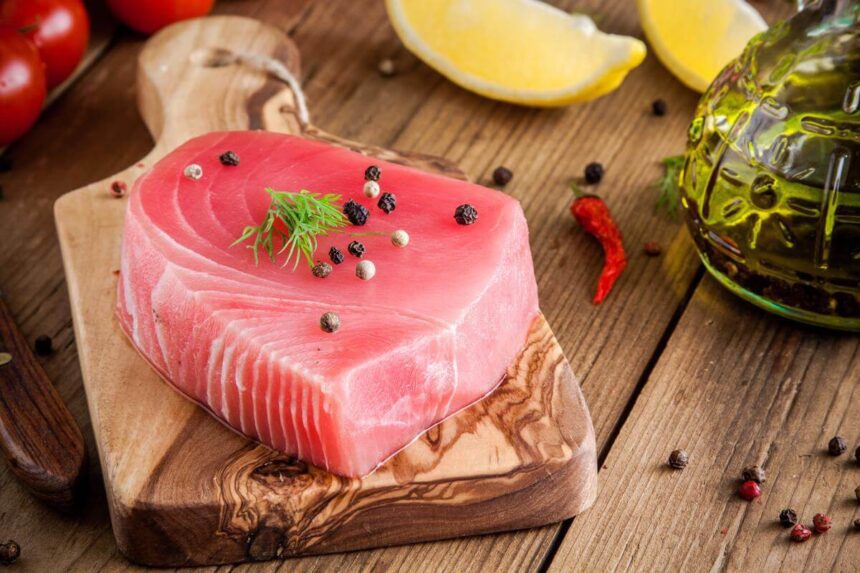As cat owners, it is our responsibility to ensure that our feline companions receive a balanced and nutritious diet. While cats are obligate carnivores, their taste preferences and dietary requirements can sometimes lead us to wonder if certain human foods are safe for them to consume. One such food that raises questions is lemon pepper tuna. In this article, we will delve into the potential risks and benefits of feeding cats lemon pepper tuna, shedding light on the factors to consider before introducing this flavor to your cat’s diet.
Can Cats Eat Lemon Pepper Tuna?
Feeding cats lemon pepper tuna is not recommended. While cats can consume plain, cooked fish as part of their diet, adding lemon pepper seasoning to the fish introduces potential risks to their health.
The Potential Risks of Lemon Pepper Tuna for Cats
High Sodium Content
Lemon pepper tuna often contains added salt as part of the seasoning process. Cats are highly sensitive to excessive sodium levels, and consuming foods high in salt can lead to health issues such as dehydration, increased thirst, and potential kidney problems. It is essential to remember that a cat’s kidneys may not be able to efficiently process excessive salt.
Onion and Garlic Content
Many lemon pepper seasoning blends contain ingredients like onion and garlic powder, both of which are toxic to cats. These substances can lead to a condition called hemolytic anemia, which can be life-threatening if ingested in sufficient quantities.
Potential Allergic Reactions
Cats, like humans, can develop allergies to certain foods. While it is less common for cats to have allergic reactions to fish, it is still a possibility. The additional seasoning in lemon pepper tuna may increase the likelihood of an allergic reaction, manifesting as skin irritation, gastrointestinal upset, or respiratory distress.
Disruption of Palatability
Cats can be extremely particular about the flavors and textures of their food. Introducing a strongly flavored food like lemon pepper tuna may alter their preferences, making it challenging to transition back to their regular diet. This can result in appetite loss, weight loss, and nutritional deficiencies if the cat refuses to eat their usual balanced meals.
Healthier Alternatives for Your Feline Companion
While it is important to avoid feeding cats lemon pepper tuna, there are several safe alternatives that can provide them with the necessary nutrients and variety in their diet:
Plain Cooked Fish
Offering your cat small amounts of plain cooked fish like salmon or whitefish can be a healthy addition to their diet. Ensure that the fish is thoroughly cooked, boneless, and does not contain any seasonings or added ingredients.
Commercial Cat Food
Specially formulated commercial cat foods provide a balanced and complete diet for your feline friend. Opt for high-quality brands that contain real meat as the primary ingredient and meet the nutritional standards set by reputable authorities.
Homemade Cat Food
If you prefer preparing your cat’s meals at home, consult with a veterinarian or a veterinary nutritionist to ensure that the recipes meet your cat’s specific nutritional requirements. This will help you avoid any deficiencies or excesses that could harm your cat’s health.
Treats Specifically Designed for Cats
There are numerous cat treats available on the market that are formulated to meet feline dietary needs. These treats offer a range of flavors, textures, and nutritional profiles, providing a safe and enjoyable snacking option for your cat.
FAQ’s
Can I feed my cat lemon pepper tuna in small amounts?
It is not recommended to feed cats lemon pepper tuna, even in small amounts. The seasoning, particularly the high sodium content and ingredients like onion and garlic, can be harmful to cats. It is best to avoid introducing this flavor to your cat’s diet.
What should I consider when choosing commercial cat food?
When selecting commercial cat food, it is important to opt for high-quality brands that prioritize real meat as the primary ingredient. Look for products that meet the nutritional standards set by reputable authorities, as these ensure a balanced and complete diet for your cat. Additionally, consider your cat’s specific needs, such as age, weight, and any dietary restrictions, and choose a product that aligns with those requirements.
Can cats develop allergies to fish?
While it is less common for cats to have allergies to fish, it is still a possibility. Cats, like humans, can develop allergies to certain foods. If you notice any signs of allergic reactions in your cat, such as skin irritation, gastrointestinal upset, or respiratory distress, it is best to consult with a veterinarian for proper diagnosis and guidance.
Are there any specific nutrients that cats require in their diet?
Yes, there are several essential nutrients that cats require in their diet for optimal health. Some key nutrients for cats include taurine, which is essential for heart function and vision; arachidonic acid, an omega-6 fatty acid important for skin and coat health; vitamin A, crucial for vision, growth, and immune function; and high-quality animal protein, which provides the necessary amino acids. Cats also have a higher requirement for certain vitamins and minerals compared to other animals, so it is important to ensure their diet meets these specific needs.
Can I give my cat flavored tuna meant for human consumption?
It is generally not recommended to give flavored tuna meant for human consumption to cats. Flavored tuna often contains additional seasonings, such as lemon pepper or other spices, which can be harmful to cats. Moreover, the high sodium content and other ingredients like onion and garlic can pose health risks to cats. It is best to stick to plain cooked fish without any seasonings when offering fish to your cat.
Conclusion
When it comes to the feline diet, it is crucial to prioritize the health and well-being of our cats. While lemon pepper tuna may be tempting to share with our feline companions, it poses several risks that outweigh any potential benefits. High sodium content, onion and garlic powder, potential allergic reactions, and disruption of palatability are all concerns that should discourage us from including lemon pepper tuna in our cats’ diet. Instead, focus on providing a nutritionally balanced and species-appropriate diet that meets their unique needs. Consulting with a veterinarian or veterinary nutritionist is always recommended to ensure your cat receives the best possible care and nutrition.



